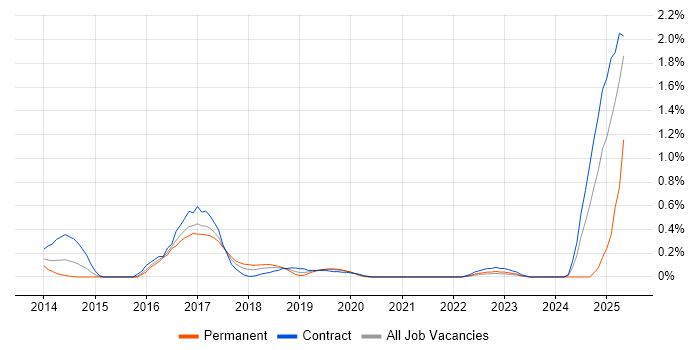Kx Systems Kdb+
Scotland > Glasgow
The table below provides summary statistics for permanent job vacancies advertised in Glasgow requiring Kdb+ skills. It includes a benchmarking guide to the annual salaries offered in vacancies that cited Kdb+ over the 6 months leading up to 31 May 2025, comparing them to the same period in the previous two years.
| 6 months to 31 May 2025 |
Same period 2024 | Same period 2023 | |
|---|---|---|---|
| Rank | 70 | - | - |
| Rank change year-on-year | - | - | - |
| Permanent jobs citing Kdb+ | 6 | 0 | 0 |
| As % of all permanent jobs advertised in Glasgow | 1.04% | - | - |
| As % of the Database & Business Intelligence category | 4.72% | - | - |
| Number of salaries quoted | 0 | 0 | 0 |
| Median annual salary (50th Percentile) | - | - | - |
| Scotland median annual salary | - | - | - |
All Database and Business Intelligence Skills
Glasgow
Kdb+ falls under the Databases and Business Intelligence category. For comparison with the information above, the following table provides summary statistics for all permanent job vacancies requiring database or business intelligence skills in Glasgow.
| Permanent vacancies with a requirement for database or business intelligence skills | 127 | 1,468 | 281 |
| As % of all permanent jobs advertised in Glasgow | 22.09% | 36.55% | 18.56% |
| Number of salaries quoted | 42 | 183 | 160 |
| 10th Percentile | £33,975 | £33,000 | £38,250 |
| 25th Percentile | £37,500 | £42,500 | £44,949 |
| Median annual salary (50th Percentile) | £55,000 | £53,000 | £59,500 |
| Median % change year-on-year | +3.77% | -10.92% | +23.44% |
| 75th Percentile | £65,938 | £61,250 | £70,000 |
| 90th Percentile | £98,425 | £74,350 | £75,000 |
| Scotland median annual salary | £55,000 | £52,500 | £60,000 |
| % change year-on-year | +4.76% | -12.50% | +9.09% |
Kdb+
Job Vacancy Trend in Glasgow
Job postings citing Kdb+ as a proportion of all IT jobs advertised in Glasgow.

Kdb+
Salary Trend in Glasgow
3-month moving average salary quoted in jobs citing Kdb+ in Glasgow.
Kdb+
Co-occurring Skills and Capabilities in Glasgow by Category
The follow tables expand on the table above by listing co-occurrences grouped by category. The same employment type, locality and period is covered with up to 20 co-occurrences shown in each of the following categories:
